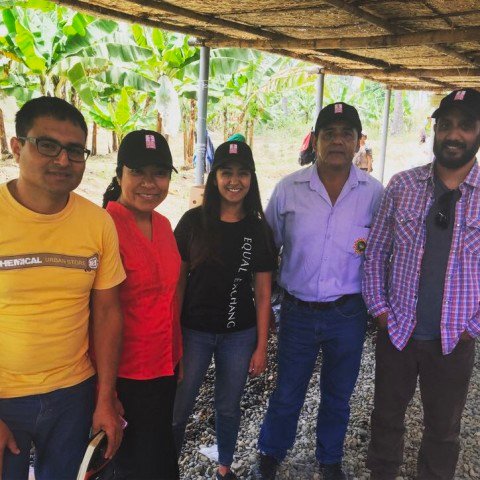Unconventional Bananas in Peru: Interview with Julio Oscar Gallegos Herrera-Rambla
Equal Exchange Sourcing Manager Ravdeep with Julio Oscar Gallegos Herrera-Rambla and CEPIBO staff in 2017. Left to right: Walter Garrido, Certifications Manager; Leticia Gutierrez, Logistics Coordinator; Ravdeep Jaidka; Jorge Socola, Former President; Julio Oscar Gallegos Herrera-Rambla, Administrative Manager
The U.S. market tends to treat bananas as commodities, as in unspecialized products that are virtually interchangeable, regardless of origin. Following a century of well-documented exploitative practices by U.S. banana companies, the fruit remains a top seller at U.S. grocery stores. Thanks to the conventional system, bananas are everywhere, cheap as can be, and divorced entirely from the circumstances of their production in the minds of consumers. One banana is like any other.
Equal Exchange aims to dismantle that paradigm, working with a movement of independent businesses – farmer co-ops, distributors, stores – to create a banana supply chain that is unconventional at every step. In a sensitive industry, we look to the farmer organizations revolutionizing the banana trade to envision a future in which the industry represents and benefits all stakeholders.
The Valle del Chira has a special micro-climate that is hot and dry, allowing organic bananas to grow with less threat of plant diseases that spread easily in wetter climates.
EE has partnered with CEPIBO, an association of small organic banana producers in Piura, Peru, for 8 years. This week, I had the chance to chat with CEPIBO’s Administrative Manager, Julio Oscar Gallegos Herrera-Rambla, about the unique small farmer sector in which he works, and the future he sees for smallholder banana production.
CEPIBO’s members grow bananas in the Valle del Chira (Chira Valley) in Northern Peru. The valley is part of a micro-climate that is hot and dry and consequently ideal for organic banana farming, since plant diseases are less likely to spread or prosper than they are in the humid tropics.
Unlike other Latin American countries, Peru did not enter the banana export industry until relatively recently. According to Julio, small farmers in Northern Peru began growing organic bananas for export around 20 years ago, having observed the successful industry just across the border in Ecuador. At the outset, these farmers were selling fruit by themselves, typically to the largest exporters. This presented a disadvantage: since small farms in the region are on average just 3 hectares (7.5 acres), a single farmer didn’t have many levers to pull in negotiations with multinational shippers, who could thus dictate prices and volumes at their convenience.
Over time, farmers began to organize into associations and cooperatives. In 2003, CEPIBO was founded by small producers who recognized that they could build collective power if they formed a block and aggregated supply. Says Julio,
“CEPIBO has always been about small producers working for small producers”
Photo courtesy of Julio Oscar Gallegos Herrera (pictured), Administrative Manager at CEPIBO
Julio, himself, is not a farmer; he studied Business Administration at the University of Piura, and began his career in the private sector. He gained experience in logistics and exportations, working with large conventional export companies. In 2013, after years of working for private companies, he decided to break off and start his own consultancy for export businesses. CEPIBO was his first client, at a time when its business and organic banana production were thriving.
But agriculture, and international trade, can be tremendously volatile. Over the years, CEPIBO has had its share of difficulties in a brutal and unforgiving banana market, where small farmers are competing with lower-priced plantation-grown bananas from other countries and facing the unique challenge of implementing standardized agricultural practices across hundreds of smallholder farms. In 2017, Julio was invited to work with CEPIBO again at a critical moment for the association:
“CEPIBO was facing a strong economic crisis, and that is why they requested my support to analyze the situation and improve management practices.”
A year later, Julio signed on as a full-time employee of CEPIBO. Julio’s prior experience with private sector greatly informs his perspective as a committed staff member at CEPIBO.
“When you start to look at the gap between the private sector and the associative (cooperative) sector, you see two realities that are very distinct. The less privileged sector has less access to resources and education, and that is due to poverty.”
For Julio, an ideal banana industry – a goal for all of us in the supply chain to work towards – would be one that:
“...doesn’t work against the planet, an ecologically sound industry that allows producers and community members the tools and the knowledge necessary to become business people who own their own land; that makes it possible for their children to access higher education of good quality.”
It may sound like a grandiose vision, but through business development and marketing of organic, fair trade fruit, CEPIBO is moving in a positive direction. The association has around 365 farmer-members and employs 14 administrative staff members, as well as around 100 staff who work in the field, harvesting and packing bananas. Julio plans to continue working in this fast-paced and challenging environment:
“I am here, honestly, because this is a commitment I have made. It’s not just about a good salary. This is about overcoming, that is the inspiration – you realize that there are some things that are worth saving.”
CEPIBO is looking toward a long future of building opportunities for its small-farmer members, and Equal Exchange and its partners across the supply chain are part of that. Through collective work,
“...we are yielding results, and that motivates you to keep going forward. CEPIBO is more stable now, and we are thinking about making plans that we would never have imagined possible before.”
Want to learn more about the unconventional EE banana supply chain? Watch this video:




